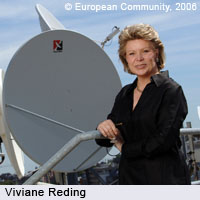Commission publishes diverging reports on telecoms regulation
The European Commission has published three reports as part of its public consultation into the regulation of electronic communications or telecoms. The Commission's proposals were published in June, and attracted stiff opposition from European telecoms operators, under the umbrella of ETNO - the European Telecommunications Network Operators' association. The June proposals suggested reducing the number of regulated markets from 18 to 12, creating a single market for European radio spectrum and increasing competition for broadband to drive uptake. ETNO wanted even less legislation in place in order to anticipate changes in the telecoms sector, and give some sort of equivalence for calls, whether made on a fixed, mobile or Internet line. More flexibility would also facilitate the anticipation of new technologies. The thee new reports, a table-breaking 665 pages in total, give considered opinions on the growth and investment of the sector, and examine market regulation. 'The 2006 Review of the EU telecom rules is of key importance for competition, investment and growth in Europe', said Viviane Reding, European Commissioner for Information Society and Media. 'This is why I have asked for economic and regulatory views from all over Europe to be taken into account during the whole review process. The studies published today are a welcome contribution to the debate and to our reflections. As we actively engage with stakeholders in reviewing the current framework and await their contributions, I would like to stress again the need to be ambitious with the policy choices ahead. The completion of the internal market for electronic communications, with enhanced cross-border competition, and exploiting radio spectrum resources to their maximum for wireless communications, must be the priority if we want to promote a competitive, knowledge-based EU economy.' The first study, conducted by London Economics and PriceWaterhouseCoopers, looked at investment in the telecoms sector and how regulation may influence investment. They concluded that seven factors would bring better regulatory certainty, which would in turn drive more growth: clear legislation; timely implementation of regulation; comprehensive guidance on interpretation of legislation; harmony between Member States; clear communication from NRAs (National Regulatory Authorities); adequate appeals process; and adequate NRA enforcement powers. 'Whilst many companies have suggested specific improvements to the regulatory framework and its implementation in these respects, many also expressed the view that the current framework was a welcome and significant improvement on the previous regulatory framework. Some also expressed the view that the development of competition meant that there was now no further need for regulation in some or all markets,' reads the report. The second report, by Hogan & Hartson LLP and Analysys Consulting Ltd, examined obstacles to the internal market and the EU's legislation. It found that likely obstacles to the internal market were: the regulatory treatment of self-supplied new technology; the status of VoIP (Internet telephony); differences in NRAs' market analysis and notification procedures; and additional delays due to national appeal proceedings. The authors suggest that many of these could be overcome through tweaking existing legislation, although it recognises that VoIP 'may raise regulatory issues across the board'. The paper goes on to list 65 specific points to consider in existing EU legislation. Finally, the Cave, Stumpf and Valletti paper examines the markets themselves, and concludes that the ideal number is 10 markets, two less than the Commission's proposals, with the removal of regulation on the mobile access and call origination market. All-in-all, the three reports had different terms of reference, and so paint rather different pictures. The Commission's proposals, ETNO's proposals, and the recommendations of the three reports sometimes agree, sometimes not, and the final regulatory decisions for Europe's telecoms operators will not be made this year. The public consultation deadline is 27 October 2006.



